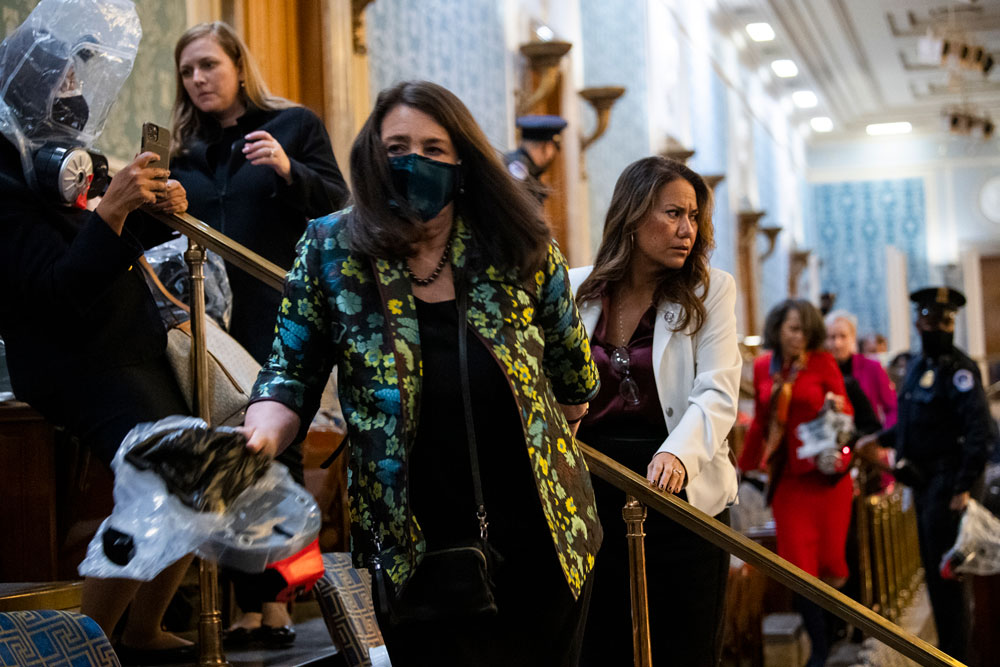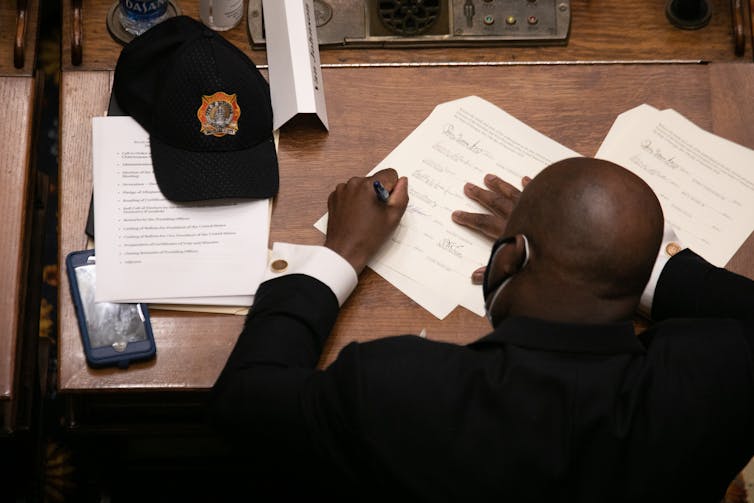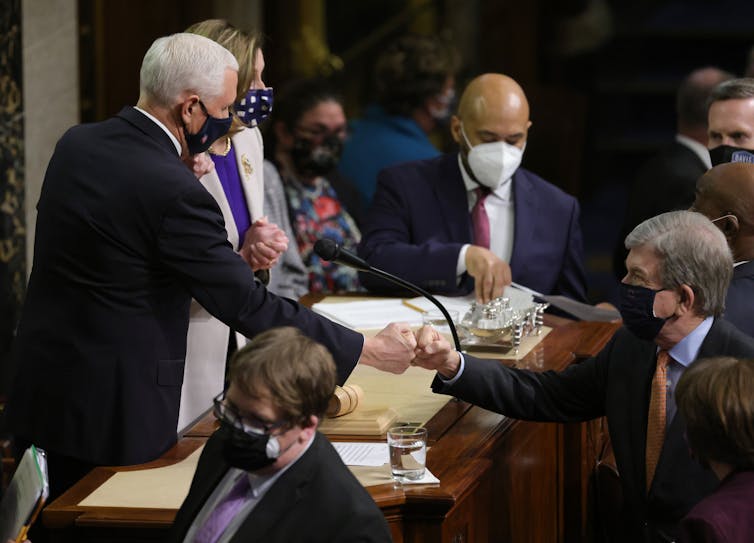
By Derek T. Muller
Presidential elections are complicated. But in a move aimed at warding off future crises like the Jan. 6, 2021, riot at the U.S. Capitol, the Senate and House have passed legislation to clarify ambiguous and trouble-prone aspects of the process.
Currently, all 50 states and the District of Columbia hold simultaneous elections in November. The states and the district certify those results.
But that’s not the end of it.
When people cast votes, they’re actually voting for a group of people called “electors.” Groups of these presidential electors meet in December. They send their votes along to Congress, which counts them in January. The presidential candidate who gets the majority of electoral votes is, finally, declared the winner.
There are known weaknesses in these rules for how we administer presidential elections and tabulate results in Congress. Ambiguities in existing law have been exploited to try to make something go wrong. Legal theories were floated by allies of President Donald Trump after the 2020 election that suggested ways to undermine the results of the election, culminating in a failed insurrection at the Capitol.
That’s why a bipartisan group of congressional leaders aimed to pass reforms to the 1887 law governing this process, the Electoral Count Act, before the end of 2022.
As an election law scholar, I have suggested that Congress focus its reforms on a few crucial areas that could have wide bipartisan support. Now, it has done just that, and the omnibus government funding legislation that includes the Electoral Count Act reform passed the House on Dec. 23 and heads to the White House for President Joe Biden’s expected signature.

Jessica McGowan/Getty Images
Discouraging mischief
The legislation, known as the Electoral Count Reform Act, was originally a stand-alone bill but was ultimately incorporated into the omnibus spending bill just passed by Congress. The reform legislation went through extensive public vetting and had broad bipartisan support.
It does many small things, but it does a few big things that deserve public attention for their ability to deter mischief in this important process.
I testified at a Senate committee hearing on the legislation at the invitation of two co-sponsors of the bill, Sens. Amy Klobuchar, a Democrat from Minnesota, and Roy Blunt, a Republican from Missouri. I have also spoken with members of Congress about its importance.
Here are the four major reforms in the bill:
1. Clarifies that Election Day is Election Day
Right now, presidential elections take place on the Tuesday after the first Monday in November. But existing law also allows states to choose presidential electors on a later date if they “failed to make a choice” on that day. This provision was designed in the mid-19th century for the few states that held runoff elections if no candidate received a majority. But no state uses it for that purpose today.
The provision leaves an open question: When has a state “failed to make a choice”? Some advocates in 2020 suggested that abstract questions about voter fraud or absentee ballots constituted such a failure and therefore meant the state could choose electors at a later date. That raised the prospect that states might send two sets of electors to Congress, a slate for the candidate who carried the popular vote and another slate, chosen later by the legislature. And that would invite Congress to undermine the popular election results by counting the second set of electoral votes.
Congress has closed that door in the Electoral Count Reform Act. There will be one day of choosing electors, with no possibility of a later choice. And state legislatures cannot show up after the election and attempt to change the rules – the bill mandates that state rules for how the election is run must be on the books before Election Day.
Ensures timely, accurate appointment of electors
In past years, especially in 2020, disputes about which votes should or should not have been counted raged on for weeks after Election Day. A federal court in Pennsylvania, for instance, rejected a lawsuit claiming that hundreds of thousands of absentee ballots cast in the 2020 presidential election should be thrown out because counties processed them differently from one another. The Electoral Count Reform Act creates a firm date for states to certify election results. Creating a firm deadline ensures a speedy end to any litigation.
Some Trump supporters in 2020 attempted to file rogue paperwork purporting to represent an alternative slate of electoral votes from a particular state. The act limits such mischief through expedited judicial review and clear obligations for state officials to submit accurate results to Congress. It requires state election officials to certify only the result that matches the outcome of the election held on Election Day, and nothing else. The act ensures that there is one true set of returns from the states.
Raises objection threshold
When Congress meets on Jan. 6 to count electoral votes, it is typically a ceremonial act. But since the 2000 presidential election, some Democratic and Republican lawmakers have objected or attempted to object to counting at least some electoral votes cast in presidential elections. Debate ensued, both in 2005 and 2021, which forced the chambers to separate and conduct two hours of debate over whether to count electoral votes.
To open debate currently requires just one member of each house of Congress to object. The act raises the objection threshold to one-fifth of the members, based on the principle that only under the most extreme circumstances should Congress consider refusing to count electoral votes.
It is simply too easy under the existing rules to cause mischief and turn this ceremony into an airing of grievances. Raising the threshold makes it harder to slow down counting and increases public confidence by refusing to give attention to baseless objections.

Photo by Win McNamee/Getty Images
Defines vice president’s power
In 2021, Trump publicly and privately pressured Vice President Mike Pence to refuse to count electoral votes during the joint session of Congress. Pence would not do what Trump wanted, arguing he had no power to do so.
The act clarifies that the role of the president of the Senate – typically, the vice president – is ceremonial. The language is updated to reflect what is already known – the vice president has no unilateral power to determine whether to count electoral votes.
While some of these concerns have been around for many years, they have come to prominence only in recent years, and none more so than around the violent insurrection that took place when Congress last counted electoral votes.
With these simple bipartisan solutions, Congress has instilled confidence in future presidential elections.
![]()
Derek T. Muller is Professor of Law at the University of Iowa.





























Jimbo99 says
What kind of legislation is Congress going to pass that prevents FTX & SBF-like off shore money laundering schemes that funded Democrats in 2020, 2022 elections and beyond ? Even HRC’s campaign of 2016 was funded similarly. The reality of 2008, HRC losing to Obama, she held her own party’s nomination hostage to eventually become Secretary of State.
https://www.nbcnews.com/id/wbna24953561
https://www.reuters.com/article/uk-usa-obama/obama-names-clinton-secretary-of-state-idUKTRE4B06WK20081201
Russia, Russia, Russia long before Trump ?
https://www.cnbc.com/2015/04/23/cash-flowed-to-clinton-foundation-as-russians-pressed-for-control-of-uranium-company.html
Just keeping it real. Jan 6th, 2021 was the lamest insurrection ever as a threat to any world government as a spin on an insurrection.
Tired of it says
When you can’t deny the facts…go with “what about…”. Keep trying to deflect from the despicable trump and the pathetic state of the Republican Party.
Tired of it says
“Merry Christmas to EVERYONE, including the Radical Left Marxists that are trying to destroy our Country, the Federal Bureau of Investigation that is illegally coercing & paying Social and LameStream Media to push for a mentally disabled Democrat over the Brilliant, Clairvoyant, and USA LOVING Donald J. Trump,” the former president wrote.
Says it all.
Ray W. says
You wrote that you were keeping it real. Then you didn’t keep it real. Please do better. I know that you are capable of so much more.
Sheila Zinkerman says
Reason for hope: bipartisanship. Parties have a lot in common when it comes to election integrity but each party underestimates the amount of that support by the other party. Common Sense American did a report measuring these perceptions. There is reason for hope.
https://www.commonsenseamerican.org/2022-take-action/elections-pb-1/results/
Michael Cocchiola says
This should be called the Protect America From Trump Act.
JimBob says
As Floridians, we know Trump is the least of our worries!
Aj says
Will it work? Will another Republican do something similar? Time will tell. Good to see Repubs and Dems working together. Unusual but it does happen very seldom.
Skibum says
I am very pleased that this legislation passed both houses of Congress and will be signed into law by the president. I hope our nation never again has to go through the horror that was the Jan. 6 insurrection and the big lie about massive election fraud that never occurred in the 2020 presidential election. I believe the disgraced, twice impeached former president will go down in history as the worst president ever. But there are a lot of others still out there, so we as a nation need to watch our back because I don’t for one second think they will just go away quietly.
Bob says
It was still an insurrection. {I’m curiously: who wears the pants in your house, looks like it’s not you}
Hookah Smoking Caterpillar says
Insurrection? Perhaps you should ask Marie Antoinette what a real insurrection looks like?
Laurel says
Well, like it or not, we owe a lot to Trump. No one ever thought anyone would pull half the stunts and lies that Trump pulled. Even the Republicans told Nixon to resign, and Nixon looked like child’s play compared to Trump’s antics. Trump has shown us all the back doors, dark cracks in the system and manipulations that can be done to our democracy. We just never dreamed it until he came along!
So, thank you Trump for showing us what real devious behavior can do, so that now we can fix it ensuring that it never happens to our country again. We will now have better legislation to prevent disingenuous, overbearing egos from taking over and trying to ditch our Constitution.
It’s not over yet, but I believe the grifter has been exposed and hope he, and his kind, will not ever succeed. We came awfully close to a to a judicial system that would support his personal agenda, but I think more eyes are opening. We shall see. If he is not prosecuted to the full extent of the law, then we are still in trouble.